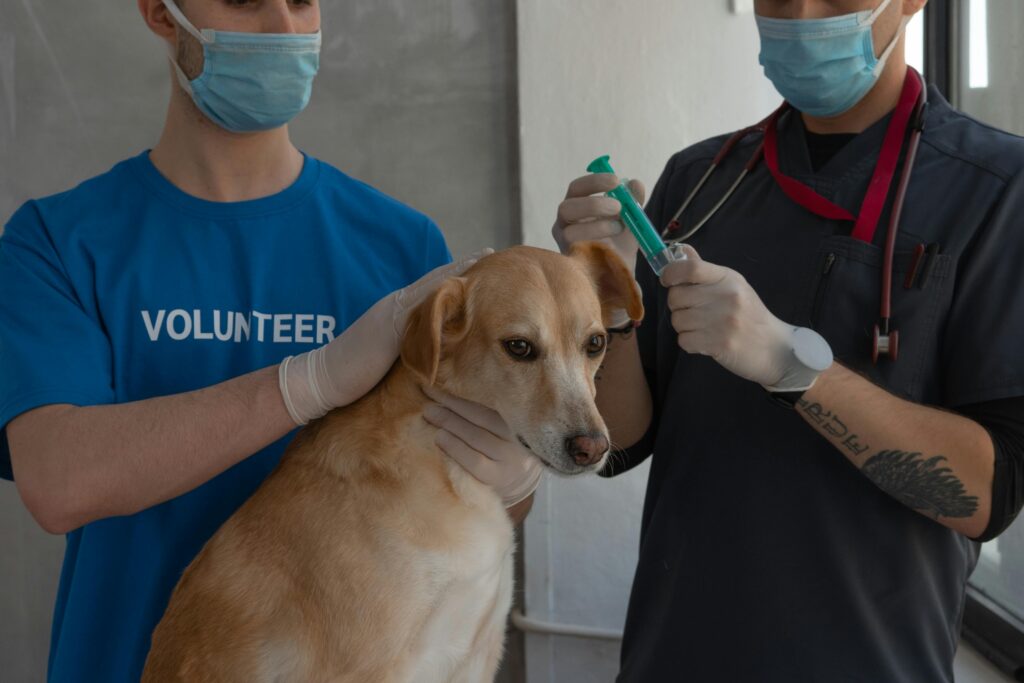Puppies should start their vaccination schedule for dogs between 6 and 8 weeks of age, receiving initial vaccinations like DHPP (Distemper, Hepatitis, Parvovirus, Parainfluenza). Puppies typically receive booster shots every 2-4 weeks until they are 16-20 weeks old. Certain vaccines may require annual boosters to sustain immunity. The mandatory vaccination schedule for dogs in India can protect your pet dog from highly infectious, incurable or potentially fatal diseases. Even 5 years ago, the occurrences of canine distemper virus (CDV) and canine parvovirus (CPV) infections weren’t as common among household pets. Today, the only way to protect your pup from these infections is by following the vaccination schedule for dogs properly.
Due to the lack of veterinary facilities during the 2020 lockdown, several pets missed their annual vaccinations schedule for dogs and it resulted in a sharp spike in viral infections among household pets
across the world. Sadly, most of these diseases don’t have a cure and even if a dog manages to survive these infections, they have lifelong effects including nervous issues, digestive problems, heart problems, respiratory distress and/or mobility issues. While many pet parents are concerned about the cost of vaccinations schedule for dogs and the recurring cost of boosters, administering the mandatory vaccines for dogs on time is much cheaper than the treatment required for any of the diseases they prevent. The only way to keep your puppy and dog healthy is by following a proper vaccination schedule. Never miss a vaccination or booster. Even a 10 days delay in vaccination can have serious consequences
on your pup’s health.

Puppy Vaccination Schedul
6-8 weeks:
Initial DHPP vaccination .
12-16 weeks:
Booster doses of DHPP and Rabies, which is a legal requirement inIndia.
15 Months:
Booster vaccinations to ensure lasting protection against commondiseases.
Important Considerations:
Rabies:
Rabies vaccination is generally administered by 90 days of age, but the frequency of booster doses varies. While some sources indicate annual boosters, others suggest that booster doses are only needed every 2 years, or as needed to maintain adequate antibody levels. Post-exposure prophylaxis (PEP) may involve a different vaccination schedule . For individuals at high risk of rabies exposure, like veterinarians and
laboratory workers, pre-exposure vaccination is recommended. This typically involves a series of three doses, with subsequent booster doses as needed to maintain protective antibody levels, according to some sources. PEP is a vaccination series administered after exposure to a potentially rabid animal. The CDC recommends a specific schedule of doses on days 0, 3, 7, and 14, and potentially a fifth dose on day 28
for immunocompromised individuals. The need for booster doses and their frequency depend on factors
like the individual’s previous vaccination history, their risk of exposure, and their immune status. Some sources suggest annual boosters, while others recommend booster doses every 2 years or as
needed to maintain protective antibody levels. The rabies vaccine is generally given intramuscularly (IM) in the deltoid area of adults or the anterolateral thigh of young children. The vaccine must not be given in the gluteal muscles due to the possibilityof poor absorption from that site and lower neutralizing antibodytiters.
DHPP:
The DHPP vaccine for dogs protects against canine distemper, adenovirus (Hepatitis), parvovirus, and parainfluenza. These are
serious and potentially fatal diseases. The DHPP vaccine is a core
vaccine that all dogs should receive .
Distemper :
A highly contagious viral disease that can cause fever,respiratory problems, eye discharge, and neurological damage. It canbe fatal, and dogs that survive may have permanent neurological damage.
Hepatitis :
An adenovirus infection that can cause fever, vomiting, diarrhea, and jaundice. It’s less severe than distemper but still a serious concern.
Parvovirus:
Canine parvovirus (parvo) is a highly contagious viral disease in dogs, often causing severe vomiting, diarrhea, and dehydration. It can be fatal, especially in puppies and unvaccinated dogs. Vaccination is the
most effective way to protect dogs from parvo.
Parainfluenza:
Parainfluenza is a group of respiratory viruses that can cause a range of illnesses, from mild upper respiratory infections like the common cold to more severe lower respiratory infections like croup, bronchiolitis, and pneumonia. It’s important to note that while parainfluenza can be associated with kennel cough in dogs, it’s distinct from the human parainfluenza viruses.
Booster Doses:
Booster doses are necessary to maintain immunity levels, and the frequency depends on the specific vaccine and your vet’s recommendations.
Breeder/Rescue Information:
If you adopt or purchase a puppy, inquire about previous vaccinations and timing to ensure the vaccination schedule is completed correctly.
Personalized Schedule:
A veterinarian can create a personalized vaccination schedule for your dog based on their individual needs and lifestyle, including factors like their age, breed, and exposure risks. This ensures the most appropriate protection from diseases for your pet.
Individualized Approach :
Veterinarians consider factors like your dog’s age, breed, and lifestyle (e.g., whether they go to dog parks or travel) to determine the best vaccination schedule.
Core Vaccines:
Some vaccines are considered essential for all dogs, like those against distemper, hepatitis, parvovirus, and rabies.
Lifestyle vaccines :
These may be recommended based on your dog’s lifestyle and potential exposure to certain diseases. Examples include vaccines for leptospirosis, Lyme disease, and canine influenza.
Vaccination schedule:
Your veterinarian will determine the specific schedule based on your dog’s age, breed, lifestyle, and other factors. They will also discuss the potential risks and benefits of each vaccine.